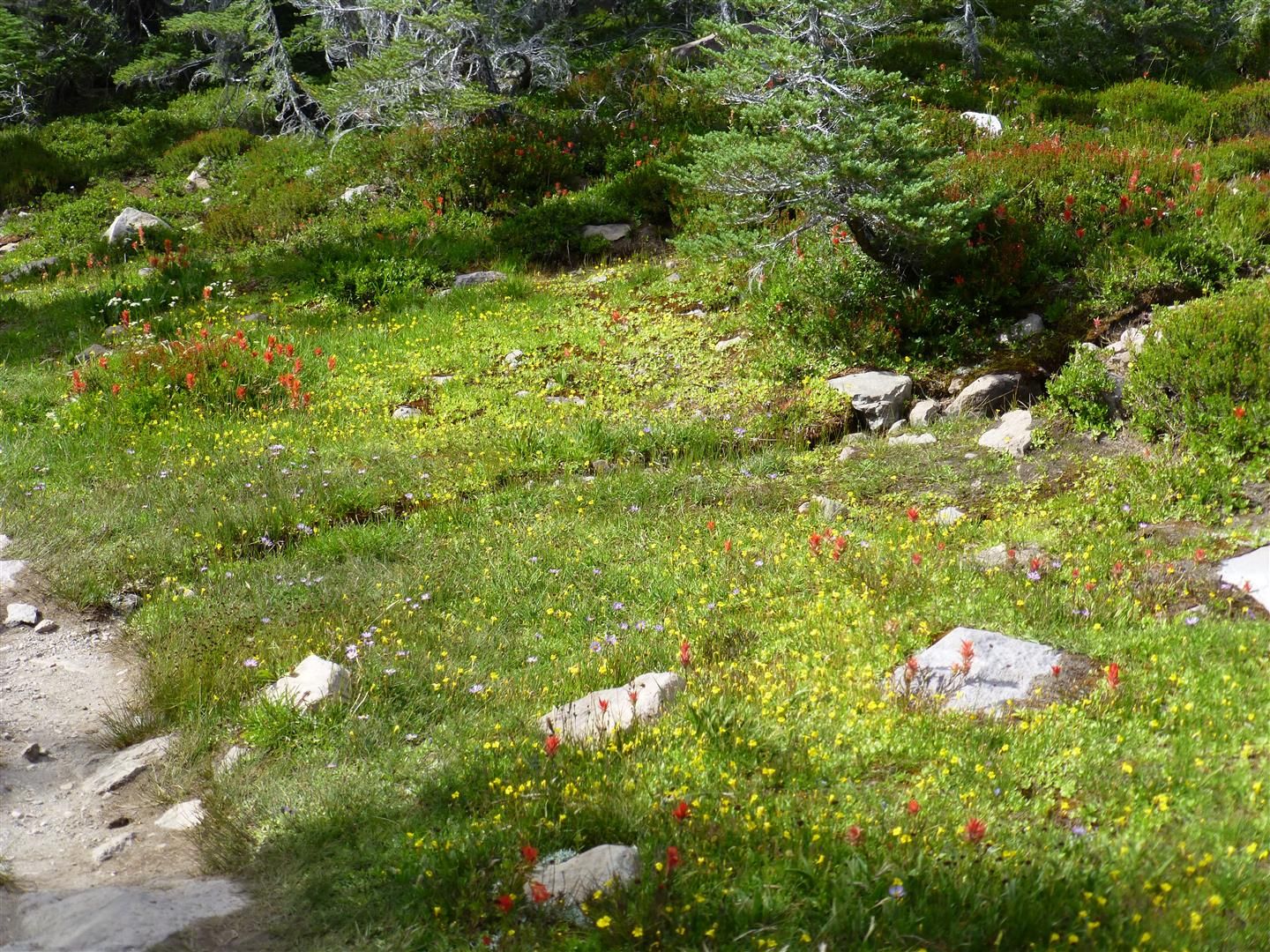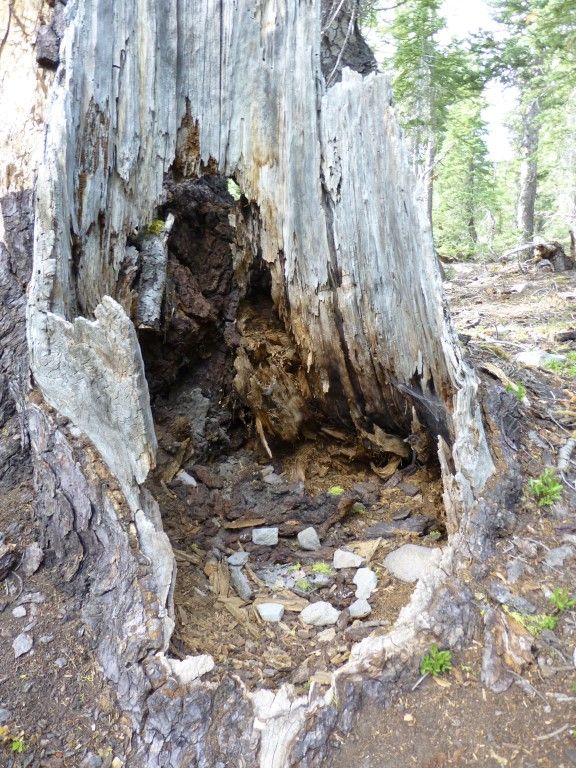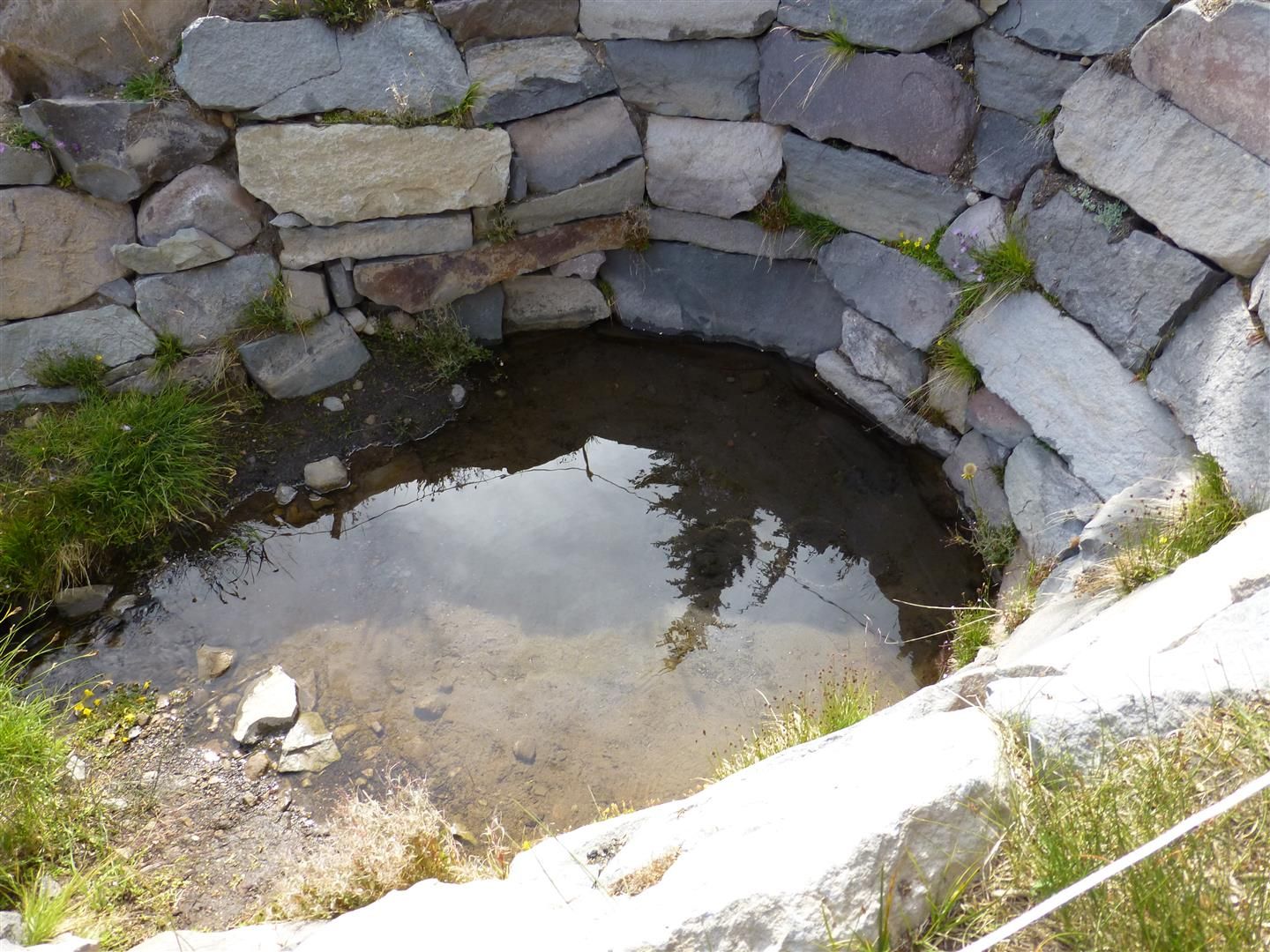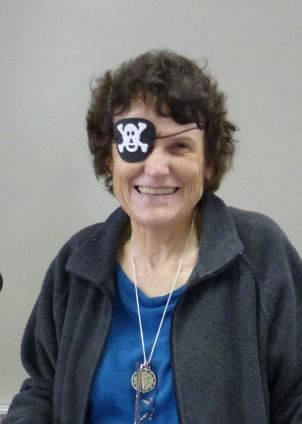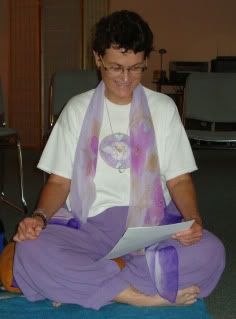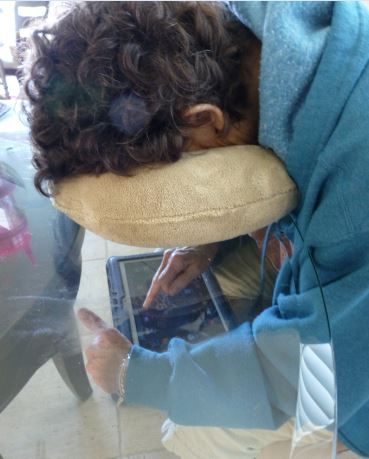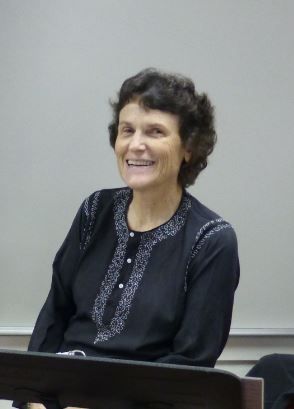A $2 Orange Pillow
It's almost impossible to get through December without thinking about the holidays and gift giving. But how many people remember what they got for Christmas last
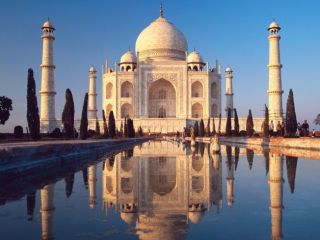 year, or Christmas a few years ago? It's not that the gift had to be
memorable. Instead, maybe it's because gift giving has become like
eating - just something one does. I was like that myself, until one day
in India when I realized, trite as it may sound, gift giving was more
about what I was receiving.
year, or Christmas a few years ago? It's not that the gift had to be
memorable. Instead, maybe it's because gift giving has become like
eating - just something one does. I was like that myself, until one day
in India when I realized, trite as it may sound, gift giving was more
about what I was receiving.I went to India on a three-week pilgrimage with a spiritual group intent on meditating in holy sites, visiting temples, and doing what we could in the slums of India. It's a country of two billion people that assaults the senses on every level. The cultural adjustment is immediate. Upon arrival, the sights, smells, sounds, pollution, heat and humidity are overwhelming, yet there's a noticeable current of serenity amid the noises of traffic, the endless horn blowing, and the people and cows walking the overcrowded streets.
India
is also a land of contrasts with designer stores on paved foundations
flanked by small shops on dirt pathways selling inventories of single
items like thread or tin pots. Our boutique hotel, complete with a
uniformed doorman, shared a lane with squatters living in the dirt under
rotted tarps supported by tree branches. Some of 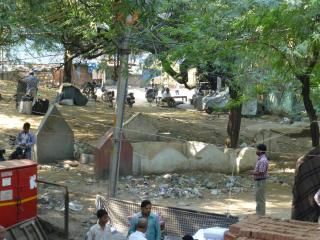 the dwellers lived in the shells of rusted out cars. A few shared a
patchwork hut of corrugated cardboard with a galvanized awning that
was considered a luxury. These living conditions, prevalent in the
country, defy comprehension.
the dwellers lived in the shells of rusted out cars. A few shared a
patchwork hut of corrugated cardboard with a galvanized awning that
was considered a luxury. These living conditions, prevalent in the
country, defy comprehension.
Because we sat on the floor of the temple during meditations several of us needed to buy a cushion. Our hotel driver Salim took us to a local seller because he felt the designer stores would be horribly overpriced. He was right. We bought four cushions for $8 whereas the cushions would have cost $25 each in the designer stores. It was then we learned from Salim that a good wage in Delhi was $20 a month.
 the dwellers lived in the shells of rusted out cars. A few shared a
patchwork hut of corrugated cardboard with a galvanized awning that
was considered a luxury. These living conditions, prevalent in the
country, defy comprehension.
the dwellers lived in the shells of rusted out cars. A few shared a
patchwork hut of corrugated cardboard with a galvanized awning that
was considered a luxury. These living conditions, prevalent in the
country, defy comprehension.Because we sat on the floor of the temple during meditations several of us needed to buy a cushion. Our hotel driver Salim took us to a local seller because he felt the designer stores would be horribly overpriced. He was right. We bought four cushions for $8 whereas the cushions would have cost $25 each in the designer stores. It was then we learned from Salim that a good wage in Delhi was $20 a month.
Before
leaving Delhi for northern India we had to lighten our luggage so I
wanted to give the cushion away. I'd seen the woman who lived in the
dirt under the tarps. 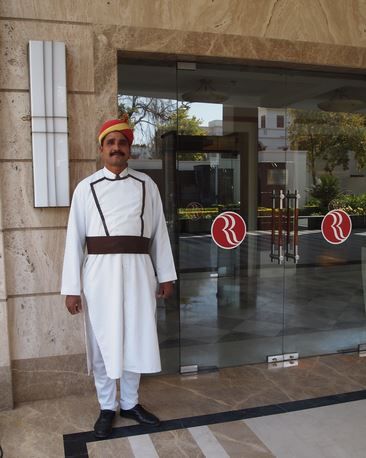 Every day she cut fresh tree branches to support her decaying roof.
I'd walked past her dwelling several times, noticing only a small candle
for light in the dingy interior.
Every day she cut fresh tree branches to support her decaying roof.
I'd walked past her dwelling several times, noticing only a small candle
for light in the dingy interior.
Not knowing what protocol to follow I went down the lane to give her the cushion. I was stopped by the uniformed door man who did not speak English but clearly did not want me to walk down the lane. Our pantomime of flailing gestures summoned an elderly man who came out of the dwelling to see what was happening. He spoke English so translated for the doorman what I wanted to do.
 Every day she cut fresh tree branches to support her decaying roof.
I'd walked past her dwelling several times, noticing only a small candle
for light in the dingy interior.
Every day she cut fresh tree branches to support her decaying roof.
I'd walked past her dwelling several times, noticing only a small candle
for light in the dingy interior. Not knowing what protocol to follow I went down the lane to give her the cushion. I was stopped by the uniformed door man who did not speak English but clearly did not want me to walk down the lane. Our pantomime of flailing gestures summoned an elderly man who came out of the dwelling to see what was happening. He spoke English so translated for the doorman what I wanted to do.
All
of a sudden the doorman began to tear up as he moaned in Hindi. He put
his hand over his heart and kept shaking his head. The old man
translated for me what was happening. It seems the woman I'd seen
cutting the tree branches was his wife. This job he held was the sole
support of an extended family living under the tarps and cardboard. He
too lived under the tarps, appearing at the hotel daily to shower and
put on the hotel-provided uniform. He was crying because no one had
simply given something to him or his wife before and he was overcome
with emotion. The old man who I learned later was his father, put his
arm around the uniformed man's shoulder and both of them cried as they
hugged the orange cushion.
In
that single moment I understood the impact of what he said and tears
welled up in my eyes as well. This was India, where people living in
the dirt under tarps could never afford a $2 orange cushion. This was
India, where a $2 orange cushion that I could have easily tossed away,
had caused a grown man and his father to cry with gratitude. This was
India, where upon my return to Delhi, walking past the dwelling one
night, I saw a $2 orange cushion glowing in the candlelight of the
otherwise colorless interior.
This was the gift of a $2 orange cushion. But the gift was in receiving the unheard of gratitude and heart-felt smiles from street dwellers who saw the cushion as a beacon that someone cared. The gift kindled a visceral appreciation for the bounty we have in this country and often take for granted. The $2 orange cushion memory stays with me every day, but it's especially magnified during the Christmas gift-giving season.
This was the gift of a $2 orange cushion. But the gift was in receiving the unheard of gratitude and heart-felt smiles from street dwellers who saw the cushion as a beacon that someone cared. The gift kindled a visceral appreciation for the bounty we have in this country and often take for granted. The $2 orange cushion memory stays with me every day, but it's especially magnified during the Christmas gift-giving season.
Jo Mooy - December 2014

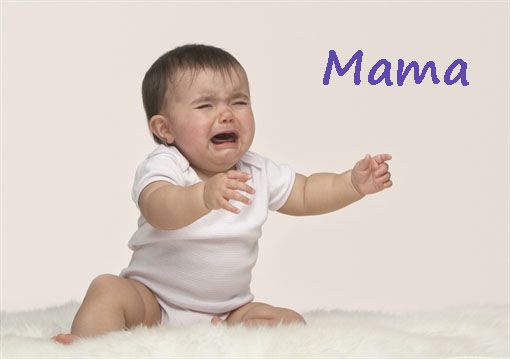
 gentle checking in with mom? What memories or needs were being
activated in the baby? And why was the mother being summoned and not
others around the baby? I recalled the teaching of a Sufi mystic. He
said look beyond what was appearing and you would find what was actually
transpiring. So I did.
gentle checking in with mom? What memories or needs were being
activated in the baby? And why was the mother being summoned and not
others around the baby? I recalled the teaching of a Sufi mystic. He
said look beyond what was appearing and you would find what was actually
transpiring. So I did. we most need it, they've forgotten how to contact Her. This
disconnection is especially true given the nightly news barrage of
misery around the world. On an evening walk my neighbor commented that
everything she saw on the news was so upsetting it was making her sick
to watch it. I asked her if she could do anything about what she saw
on TV. She didn't think so. I suggested she pray for everything to
work out. She thought about it and said, "I forgot I could do that."
we most need it, they've forgotten how to contact Her. This
disconnection is especially true given the nightly news barrage of
misery around the world. On an evening walk my neighbor commented that
everything she saw on the news was so upsetting it was making her sick
to watch it. I asked her if she could do anything about what she saw
on TV. She didn't think so. I suggested she pray for everything to
work out. She thought about it and said, "I forgot I could do that." 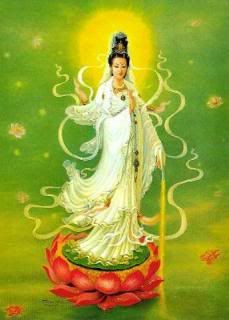 children were saved. She is the ultimate "Mother of the Universe" or
"Mama" that we can call and who promised to hear our cries. This Great
Mother said no matter the trial or tribulation, if her children called
her she would take the form needed and come to their aid. And so the
stories of her help are documented all over the world.
children were saved. She is the ultimate "Mother of the Universe" or
"Mama" that we can call and who promised to hear our cries. This Great
Mother said no matter the trial or tribulation, if her children called
her she would take the form needed and come to their aid. And so the
stories of her help are documented all over the world. read, other than to pass the time waiting in a doctor's office. It was
filled with the types of articles that I assumed home-makers might
enjoy. But while flipping through the pages I saw a short article
called The Risk of Growing by Eda LeShan that captivated me.
read, other than to pass the time waiting in a doctor's office. It was
filled with the types of articles that I assumed home-makers might
enjoy. But while flipping through the pages I saw a short article
called The Risk of Growing by Eda LeShan that captivated me. 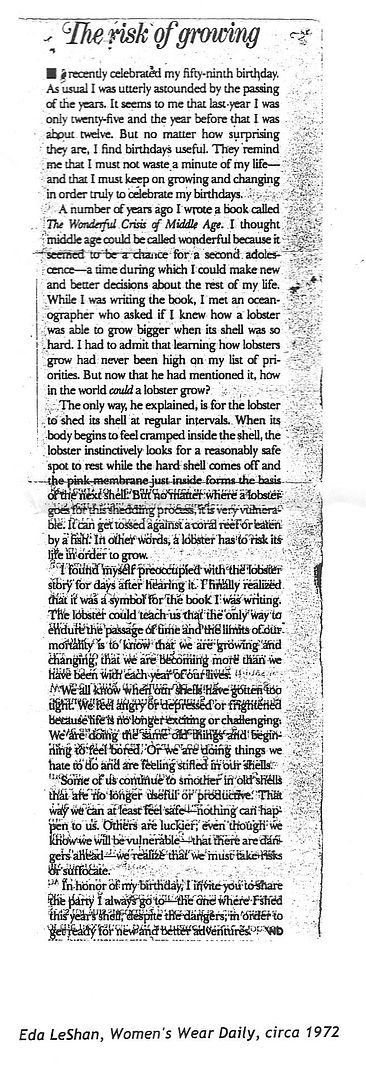 article and stuck it on the bulletin board in my office where it
remained for many years. I referred to it often, using the lobster's
story as guidance when changes in my life seemed insurmountable. I knew
I had to tough it out - whatever it was - so I could grow and change.
article and stuck it on the bulletin board in my office where it
remained for many years. I referred to it often, using the lobster's
story as guidance when changes in my life seemed insurmountable. I knew
I had to tough it out - whatever it was - so I could grow and change.
 the streets, waiting for buses, in stores and banks. All of them were
born in the 1900's. They witnessed horrific wars and the evil one human
can inflict upon another in the name of religion, nation, or culture.
Yet, they persevered and in many cases, thrived. Surely they have
something to say - perhaps some words of wisdom about their longevity,
what they'd experienced in life, or advice to the younger generations of
the 21
the streets, waiting for buses, in stores and banks. All of them were
born in the 1900's. They witnessed horrific wars and the evil one human
can inflict upon another in the name of religion, nation, or culture.
Yet, they persevered and in many cases, thrived. Surely they have
something to say - perhaps some words of wisdom about their longevity,
what they'd experienced in life, or advice to the younger generations of
the 21 detector which looks like an extension of his arm distinguishes a
unique tone when gold or silver is discovered under the sands. With
headphones tuned to the sounds, he shared stories of his many finds.
His answers to my questions were short and concise. In answer to the
first his eyes got a faraway look. Then he said, "Too many guys died in
Korea." In answer to the second: "Wars change nothing. We don't
belong there!" Realizing that the scars of that war still held Buddy,
evidenced by the Korean War Vet baseball cap he wore, I changed the
subject and asked him what he thought about when he walked the beach.
He said, "Nothing. My mind is calm and clear." And then he went on
down the beach listening for the high pitched hum of gold.
detector which looks like an extension of his arm distinguishes a
unique tone when gold or silver is discovered under the sands. With
headphones tuned to the sounds, he shared stories of his many finds.
His answers to my questions were short and concise. In answer to the
first his eyes got a faraway look. Then he said, "Too many guys died in
Korea." In answer to the second: "Wars change nothing. We don't
belong there!" Realizing that the scars of that war still held Buddy,
evidenced by the Korean War Vet baseball cap he wore, I changed the
subject and asked him what he thought about when he walked the beach.
He said, "Nothing. My mind is calm and clear." And then he went on
down the beach listening for the high pitched hum of gold. southern Utah he was delighted to engage in conversation. He talked
about his Mormon faith and of the blessings and bounty it had brought to
him and his wife. He proudly revealed he had eight children, forty
grandchildren, and t
southern Utah he was delighted to engage in conversation. He talked
about his Mormon faith and of the blessings and bounty it had brought to
him and his wife. He proudly revealed he had eight children, forty
grandchildren, and t


 outcropping we sat with the grandmothers for quite some time. We
listened as they told us of the winds which howled through the canyons
eroding their ancestors and creating soil. They pointed out the
remnants of waterways that had carved their shapes over geological time
turning them into vivid shades of reds, ochres and oranges. Eons of
lightning strikes had shattered or blackened some of the Matriarchs,
allowing the space for the arrival of the plant kingdom. Flowering
plants clung to small ledges, flourishing in the rocky arms of these
mother stones. And still The Matriarchs stood, carefully watching over
the earth.
outcropping we sat with the grandmothers for quite some time. We
listened as they told us of the winds which howled through the canyons
eroding their ancestors and creating soil. They pointed out the
remnants of waterways that had carved their shapes over geological time
turning them into vivid shades of reds, ochres and oranges. Eons of
lightning strikes had shattered or blackened some of the Matriarchs,
allowing the space for the arrival of the plant kingdom. Flowering
plants clung to small ledges, flourishing in the rocky arms of these
mother stones. And still The Matriarchs stood, carefully watching over
the earth. were the earth - the foundation and container of all land. They
witnessed the days of Genesis when the land was water and the light came
and sky was formed. Though they were solid and immobile, they watched
and patiently waited as plants grew in their dust, creating food for the
animals and humans that would some day live on the land.
were the earth - the foundation and container of all land. They
witnessed the days of Genesis when the land was water and the light came
and sky was formed. Though they were solid and immobile, they watched
and patiently waited as plants grew in their dust, creating food for the
animals and humans that would some day live on the land. 

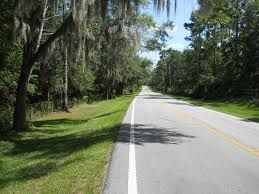 "destination" town about thirty miles northwest of Orlando. We'd been
hearing about Mount Dora for a few years. Friends described it as
"Victorian, quaint, artsy, antiques and charming." So, with our
seminars and retreats completed for the season, we took an overnight
trip to the area arriving in time for
"destination" town about thirty miles northwest of Orlando. We'd been
hearing about Mount Dora for a few years. Friends described it as
"Victorian, quaint, artsy, antiques and charming." So, with our
seminars and retreats completed for the season, we took an overnight
trip to the area arriving in time for 
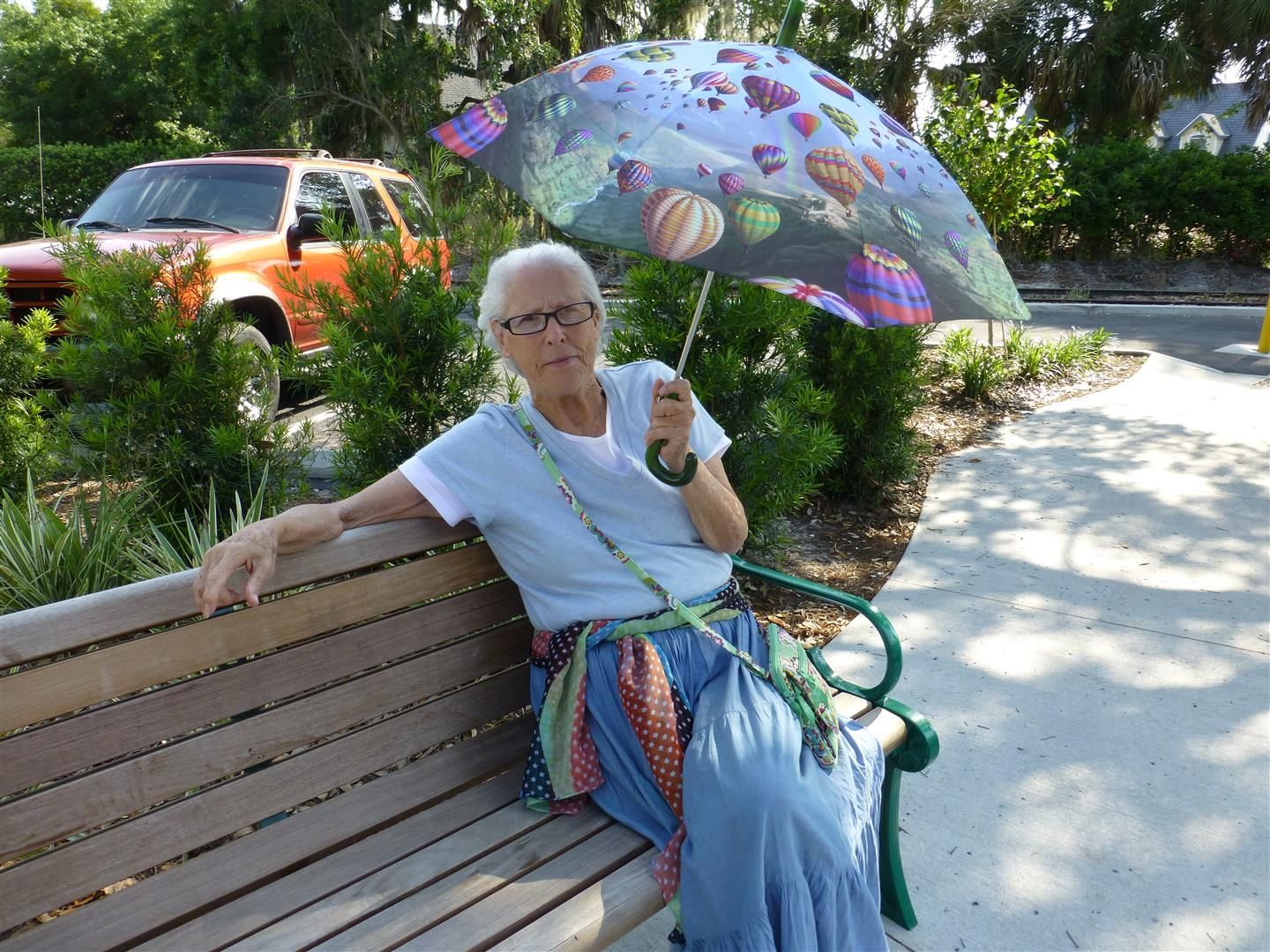
 umbrella up over her head and began to walk with us, telling us more
stories about her life. When we reached the car she saw the Namaste
bumper sticker and inquired about it. When I explained that it meant, "the Divine in me honors the Divine in you!"
and how the people in India greet one another with a hand over the
heart, a slight bow of the head, and the word "Namaste" she cooed in
delight. "I love that," she said over and over.
umbrella up over her head and began to walk with us, telling us more
stories about her life. When we reached the car she saw the Namaste
bumper sticker and inquired about it. When I explained that it meant, "the Divine in me honors the Divine in you!"
and how the people in India greet one another with a hand over the
heart, a slight bow of the head, and the word "Namaste" she cooed in
delight. "I love that," she said over and over. on the topic have changed. Thirty years ago, without hesitation, I
would have answered that an enlightened being is a Bodhisattva, one who
has reached the ultimate state of purity yet delays that passage in
order to alleviate the suffering of humanity. But now, many years and
many miles on the journey, I answered the questions quite differently.
on the topic have changed. Thirty years ago, without hesitation, I
would have answered that an enlightened being is a Bodhisattva, one who
has reached the ultimate state of purity yet delays that passage in
order to alleviate the suffering of humanity. But now, many years and
many miles on the journey, I answered the questions quite differently. As I explored the questions posed in the study I focused on my personal
journey. I'd followed a spiritual path for more than 40 years. In
that time I studied with some very well-known and some not so well-known
mystical teachers. The not so well-known teachers had as much
influence (sometimes more so) in my development as some of the very
well-known ones. A not so well-known teacher told me what I'd be doing
with my life at ages 40, 50, 60 and 70. She was right for the first
three decades. (I haven't reached the last one yet.) So, I wondered,
was she enlightened? Or, did she plant a seed that caused me to do what
she said in the time-frame she'd indicated. This much I know! She
kindled a blaze a long time ago that allowed me seek the answers that I
was now trying to decipher about enlightened beings.
As I explored the questions posed in the study I focused on my personal
journey. I'd followed a spiritual path for more than 40 years. In
that time I studied with some very well-known and some not so well-known
mystical teachers. The not so well-known teachers had as much
influence (sometimes more so) in my development as some of the very
well-known ones. A not so well-known teacher told me what I'd be doing
with my life at ages 40, 50, 60 and 70. She was right for the first
three decades. (I haven't reached the last one yet.) So, I wondered,
was she enlightened? Or, did she plant a seed that caused me to do what
she said in the time-frame she'd indicated. This much I know! She
kindled a blaze a long time ago that allowed me seek the answers that I
was now trying to decipher about enlightened beings. Genghis Khan, Alexander the Great, Einstein, Darwin, Saladin, DaVinci,
Gandhi, Akbar the Great, Nikola Tesla, Mao Zedong, and King Darius of
Persia to name a few, qualify? They were warriors and conquerors,
scientists and peacemakers, but should they be considered enlightened
beings? I now think so because they had purpose, conviction, and a
focus on their life's goal. And, they had a global impact on their
fellow humans.
Genghis Khan, Alexander the Great, Einstein, Darwin, Saladin, DaVinci,
Gandhi, Akbar the Great, Nikola Tesla, Mao Zedong, and King Darius of
Persia to name a few, qualify? They were warriors and conquerors,
scientists and peacemakers, but should they be considered enlightened
beings? I now think so because they had purpose, conviction, and a
focus on their life's goal. And, they had a global impact on their
fellow humans. humans. They are conscious of their words and actions and how it
affects those fellow humans. They are conscious of the food they eat
and how it affects their spirit and their bodies. They are conscious of
the individuals they associate with and wisely choose to be among those
who uplift their spirits. They make daily time for meditation and
reflection. They are more in tune with silence and nature. And they
choose to walk their path with ethical dignity and perseverance.
humans. They are conscious of their words and actions and how it
affects those fellow humans. They are conscious of the food they eat
and how it affects their spirit and their bodies. They are conscious of
the individuals they associate with and wisely choose to be among those
who uplift their spirits. They make daily time for meditation and
reflection. They are more in tune with silence and nature. And they
choose to walk their path with ethical dignity and perseverance. 
